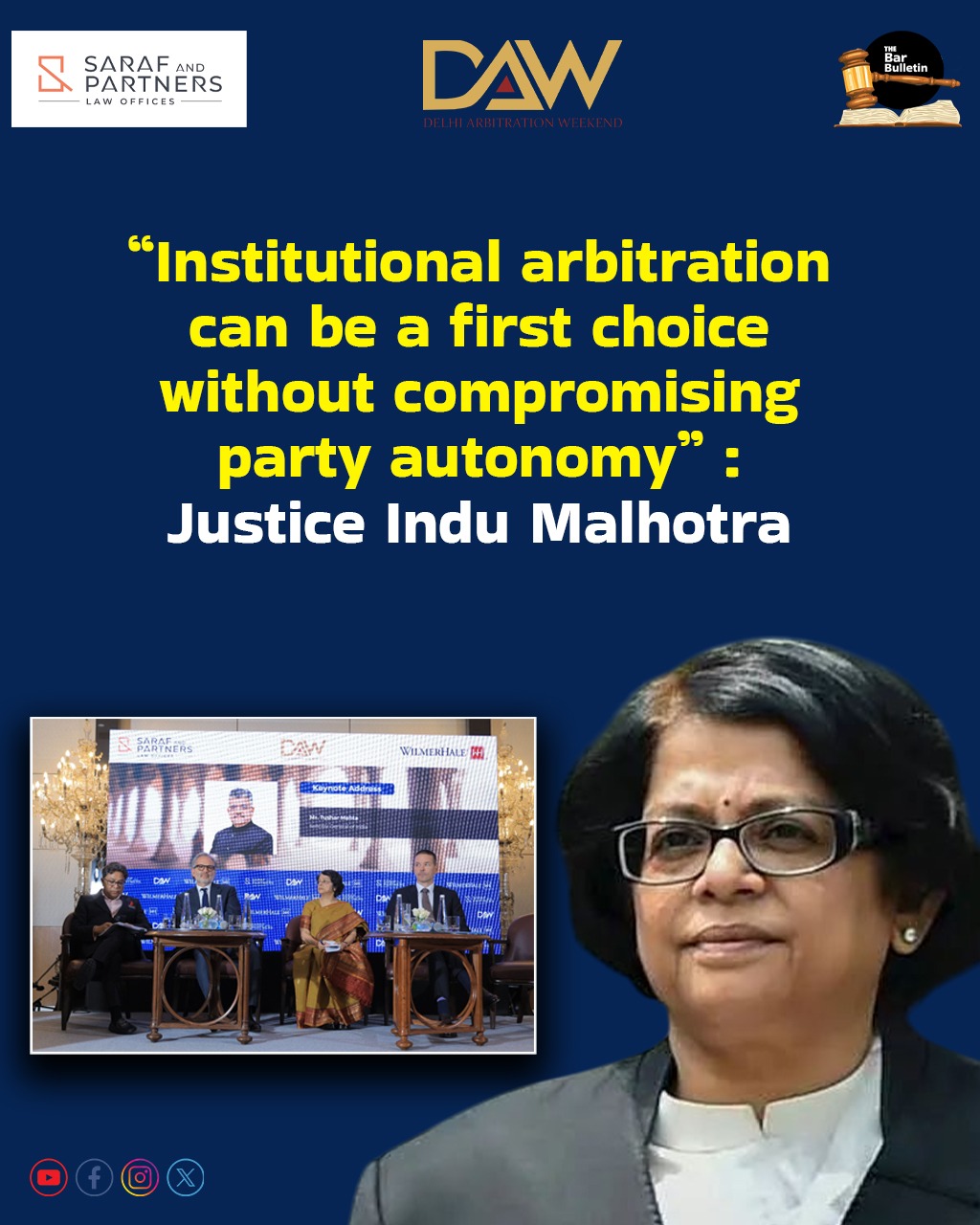The Fireside Chat co-hosted by Saraf & Partners and WilmerHale held as part of DAW 2025 by DIAC (Delhi International Arbitration Centre), brought together an eminent assembly of judicial luminaries, government representatives, and arbitration experts to explore the current landscape and future direction of arbitration in India. The session featured Justice Indu Malhotra, Former Judge, Supreme Court of India, Mr. Kevin Nash, Director General, London Court of International Arbitration (LCIA), Mr. Steven Finizio, Partner, WilmerHale, and Mr. Mohit Saraf, Founder and Managing Partner, Saraf and Partners.
The event was graced by distinguished members of the Supreme Court of India, including Justice A.K. Sikri, Justice Vikramajit Sen, Justice Indu Malhotra, Justice D.Y. Chandrachud, Justice Sanjiv Khanna, Justice Vineet Saran, Justice Hrishikesh Roy, Justice Ajay Rastogi, Justice Sanjay Kishan Kaul, Justice Hemant Gupta, and Justice S. Ravindra Bhat. From the Delhi High Court the attendees were, Justice J.R. Midha, Justice Jayant Nath, Justice Karia, Justice Subramonium Prasad, Justice Anup Jairam Bhambhani, Justice Najmi Waziri, Justice Pratibha M. Singh, and Justice Sachin Dutta. Justice Rekha Palli also participated, adding her perspectives on judicial support for arbitration and procedural integrity.
Justice Indu Malhotra highlighted the strength and reach of India’s arbitration institutions, including the Delhi International Arbitration Centre, Mumbai Centre, and the Nani Palkiwala Centre in Chennai. Justice Malhotra emphasized that these institutions provide robust infrastructure and procedural support for both domestic and international arbitrations, helping to streamline the process and build trust among parties. Justice Malhotra clarified that India has a wide range of arbitration centers across sectors and high courts, countering the perception that domestic arbitration lacks institutional support. “India has a myriad of arbitration institutions, and the choice of institutional or ad hoc arbitration rests with the parties, reinforcing autonomy as the cornerstone of an effective arbitration ecosystem,” she noted.
Justice Malhotra also stressed the importance of party autonomy and the role of credible institutions in ensuring efficiency and reliability.Justice Malhotra observed that while domestic parties often prefer ad hoc arbitration, institutional arbitration can provide speed, structure, and legitimacy without compromising choice.Justice Malhotra further highlighted that Indian courts largely support arbitration and uphold awards, making India a pro-arbitration jurisdiction. “Institutional arbitration can be a first choice without compromising party autonomy,” she affirmed, reinforcing that the evolving ecosystem in India is well-positioned to handle both domestic and international disputes efficiently
Mr. Kevin Nash addressed the global perspective on institutional arbitration. Mr. Kevin observed that while ad hoc arbitration works in cooperative scenarios, institutional arbitration often ensures greater efficiency, procedural integrity, and cost-effectiveness, especially in complex disputes. Mr. Kevin highlighted the importance of credible Indian institutions in building confidence, noting that strong institutions encourage domestic parties to choose institutional arbitration as a first preference rather than automatically defaulting to international seats. Mr. Kevin also addressed the party-appointed arbitrator debate, emphasizing that party autonomy enhances legitimacy and user trust, while institutional oversight ensures effectiveness without undermining the choice of parties.
Mr. Steven Finizio elaborated on the institutional role in maintaining high-quality and enforceable awards. Mr. Steven stressed that while ultimate enforcement depends on judicial systems, institutions are critical guardians of due process. Institutions oversee procedural compliance and liaise with arbitrators to enhance enforceability, ensuring user confidence in arbitration outcomes.
Mr. Mohit Saraf spoke about practical issues affecting the quality of arbitral awards. Mr. Saraf highlighted that reasoned awards are essential for parties to have confidence in the process and stressed the importance of selecting qualified arbitrators capable of handling complex claims effectively. Mr. Saraf pointed out that, in some cases, claimants submit disproportionate or poorly substantiated claims, which can hinder the arbitration process, emphasizing the need for adequate evidence and careful case management to ensure high-quality awards. Mr. Saraf also noted that the absence of court fees in arbitration can sometimes incentivize inflated claims, making procedural rigor and arbitrator expertise even more crucial. As he summarized, “High-quality awards depend on careful case management, qualified arbitrators, and well-substantiated claims.”
The session further addressed the enforcement challenges in India. The panel agreed that India is largely a pro-arbitration jurisdiction, with very few awards being set aside. Delays primarily occur at the Section 34 stage due to court workload rather than judicial reluctance. Justice Malhotra explained that the Supreme Court and High Courts exercise inherent powers to correct issues, and most international awards are enforced without interference, demonstrating India’s commitment to arbitration.Further, the panel discussed how institutional oversight enhances the quality and enforceability of awards. Mr. Kevin and Mr. Steven highlighted that institutions not only facilitate arbitrator appointments but also ensure process integrity and adherence to standards, thereby improving compliance and user trust.
The Fireside Chat concluded with reflections on the future of arbitration in India. Panelists emphasized the need to strengthen domestic institutions, incentivize institutional arbitration, and streamline enforcement mechanisms to make India a preferred seat for both domestic and international arbitration.



